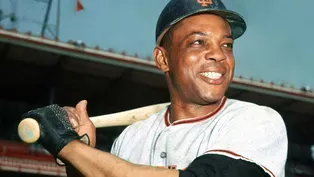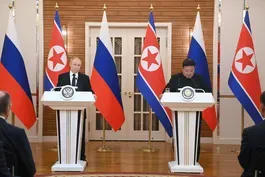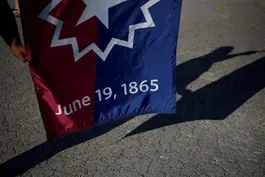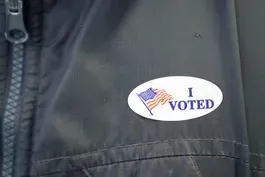
Fauci on his relationship with Trump during the pandemic
Clip: 6/19/2024 | 7m 55sVideo has Closed Captions
Fauci on his fraught relationship with Trump and the attacks he has faced
In the first part of our conversation with Dr. Anthony Fauci, he discussed his experience leading the country through the two public health crises of HIV/AIDS and COVID-19. In the second half of the interview, Geoff Bennett spoke with Dr. Fauci about his fraught relationship with former President Trump, the partisan attacks he faced that turned into real threats and how he views his own legacy.
Problems with Closed Captions? Closed Captioning Feedback
Problems with Closed Captions? Closed Captioning Feedback
Major corporate funding for the PBS News Hour is provided by BDO, BNSF, Consumer Cellular, American Cruise Lines, and Raymond James. Funding for the PBS NewsHour Weekend is provided by...

Fauci on his relationship with Trump during the pandemic
Clip: 6/19/2024 | 7m 55sVideo has Closed Captions
In the first part of our conversation with Dr. Anthony Fauci, he discussed his experience leading the country through the two public health crises of HIV/AIDS and COVID-19. In the second half of the interview, Geoff Bennett spoke with Dr. Fauci about his fraught relationship with former President Trump, the partisan attacks he faced that turned into real threats and how he views his own legacy.
Problems with Closed Captions? Closed Captioning Feedback
How to Watch PBS News Hour
PBS News Hour is available to stream on pbs.org and the free PBS App, available on iPhone, Apple TV, Android TV, Android smartphones, Amazon Fire TV, Amazon Fire Tablet, Roku, Samsung Smart TV, and Vizio.
Providing Support for PBS.org
Learn Moreabout PBS online sponsorshipGEOFF BENNETT: Now part two of our conversation with Dr. Anthony Fauci.
Last night, we discussed his experience leading the country through two of the greatest public health crises of our time, HIV/AIDS and COVID-19.
Tonight, more on his fraught relationship with former President Trump, the partisan attacks he faced that turned into real threats, and how he views his own legacy after a nearly six-decade career, all of it captured in his new memoir, "On Call: A Doctor's Journey in Public Service."
What was your relationship behind the scenes with President Trump like?
DR. ANTHONY FAUCI, Former Chief Medical Adviser to President Biden: Well, I described it in some detail in the book.
It was really -- it was complicated, because, when we first met, we had a real good rapport with us.
You know, I describe it, maybe it was sort of a guy raised in Queens and a guy raised in Brooklyn.
We had that similar New York swagger, whatever you want to call it, that we related to each other.
In the beginning, he actually listened to what we were saying and went along with it.
But when it became clear that the virus was not going to disappear and it was not going to peak in February and go away in March and April, the way the flu does, and as we got into the season of preparing for the election, then we started to go separately, because that's when I had to contradict him, which was painful for me to do that.
The people in the White House staff thought I was doing that because I wanted to get at -- not at all.
It was not comfortable for me to do that.
But that's when it went from, hey, we're buddy-buddies to this guy doesn't know what he's talking about, he's wrong most of the time, and those kinds of things.
So it started off of actually quite a good relationship.
GEOFF BENNETT: You write in the book that he once told you that he'd never had a flu shot because, to him, he'd never had the flu, so there was no reason to get a flu shot, which sort of reveals a certain lack of understanding about the kind of work that you do.
GEOFF BENNETT: Was he receptive to the information that you were sharing with him during the pandemic?
DR. ANTHONY FAUCI: Well, I think, at the moment I was giving the information to him, he was receptive.
But the way the White House worked is that you walked out of the Oval Office or the Situation Room, and then somebody else would be talking to him.
And it is, I would say, not likely, but it happened that that would contradict the information that I gave him.
So, it isn't as if I tell him this and I'm the last word, as well as with Deborah Birx too.
I mean, she would say something, and maybe not the last word.
And that's what happened when Scott Atlas came into the White House, and he would undermine some of the things that Deb Birx and I were trying to tell him.
GEOFF BENNETT: The attacks on you, the rhetorical attacks on you, actually led to real threats.
In one case, in August of 2020, you're opening your mail and this white powder just explodes all over you, your face, your chest.
It turned out that the powder was not dangerous, still a harrowing experience.
After that, you went back to work.
GEOFF BENNETT: I think a lot of people would have forgiven you if you had said, you know what, this is too much, I have served this nation well, I'm done.
But why did you go back?
Why did you continue to continue to -- continue on the job?
DR. ANTHONY FAUCI: Well, there was no question that I would go back, because this was -- I mean, this is what I do.
I mean, I'm a physician.
I'm a scientist.
I have devoted my entire professional career to fighting outbreaks of infectious disease.
There wasn't a chance in the world.
I mean, they could have had somebody come in with a gun and point that at me.
I still would have gone to work the next day.
GEOFF BENNETT: You never thought about quitting.
DR. ANTHONY FAUCI: No.
GEOFF BENNETT: How'd your family feel about that?
DR. ANTHONY FAUCI: My wife, Christine Grady, Dr. Grady, is incredibly supportive of me.
There were times when she would bring up the question: "Is this what you really want to do?"
And I would say: "Chris, yes, I do."
And once I did that, she was 100 percent supportive.
GEOFF BENNETT: Reflecting on the pandemic, the partisan policy responses, the misinformation, the disinformation, it raises the real question of whether Americans will listen to federal public health officials and the guidance that they provide the next time a major epidemic rolls around.
How do you see it?
DR. ANTHONY FAUCI: I'm very concerned, I mean, deeply concerned about what misinformation and disinformation has done, because, right now, we have what I have called and have written about as the normalization of untruths.
There's so much false information and untruths out there that, after a while, people shrug their shoulders and say, well, we don't know what's true.
And once you have a doubt as to what's true or not, science, which is based on the truth and data and evidence, all of a sudden, you stop trusting the scientific process and science.
And that's really dangerous.
GEOFF BENNETT: How do you respond to the accusations that mixed messaging from public health officials, to include yourself, added to the confusion during the pandemic and added to some of the lack of trust?
DR. ANTHONY FAUCI: You know, I think, to be perfectly honest and humble about it, there was some mixed and perhaps garbled message that came out.
It came out, I know, and the CDC even admitted that there were times when the message was garbled for the man and woman in the street.
GEOFF BENNETT: You say in the book that you wanted to reflect on what it means to devote one's life to public service.
What has that required of you and what has it required of your family?
DR. ANTHONY FAUCI: It's required some sacrifice.
In a perfect world, where there's no conflict, it's hard work, long hours, but very, very gratifying.
And the rewards that you get personally of seeing what you can do, saving lives, making people feel more safe is - - makes up for all the 16-and 18-hour days.
When you throw into that the complication of the divisiveness that we had to face, that makes it much, much more stressful, because it's tough enough, and the gratification is there.
But when you have what I and my colleagues -- I'm not alone -- had to go through, that's tough.
And I hope that that's not a disincentive for people to want to go into science, medicine, public health, and public service.
But I keep saying -- and I'm honest about it, the truth -- is that the gratification that you can get from saving lives and protecting the health of the American public is overwhelmingly, in the balance of risk/benefit, the benefit is way out there.
GEOFF BENNETT: Is that what you would tell young people who want to follow in your footsteps?
DR. ANTHONY FAUCI: I do.
I do, because they do ask me now, frequently, now, Dr. Fauci, if you were in my shoes back then, would you do this now knowing what you knew?
And I tell them, absolutely, 100 percent, I would do it again.
GEOFF BENNETT: The process of putting together a memoir like this, I imagine you think a lot about your impact, how you want to be remembered, your legacy.
What do you want people to take away from your life and your contributions to this country?
DR. ANTHONY FAUCI: You know, I think it's simple.
I think, when you talk about legacy, to me, legacy are for other people to evaluate years from now or maybe a year or two or maybe 10 years from now.
What I would like people to know, if they ask me, what do you want me to know about you, is that, without a doubt, I gave it 100 percent, 110 percent every day.
And to use a metaphor from sports, I left it all out on the court every day.
And that's what I want to be remembered for.
Whether you think I did well or how good I was or what might come, that's what I did every day.
GEOFF BENNETT: Dr. Anthony Fauci, the book is "On Call: A Doctor's Journey in Public Service."
Thanks so much for speaking with us.
We appreciate it.
DR. ANTHONY FAUCI: Thank you for having me.
The legacy of Willie Mays on and off the baseball field
Video has Closed Captions
The legacy of Willie Mays on and off the baseball field (9m 39s)
Millions face record-breaking temperatures amid heat wave
Video has Closed Captions
Millions face record-breaking temperatures amid dangerous heat wave (6m)
Putin's North Korea pact could land weapons for Ukraine war
Video has Closed Captions
Putin signs pact with North Korea that could increase weapons for Russia's war in Ukraine (8m 5s)
Report shows formerly enslaved people were ousted from land
Video has Closed Captions
Report reveals how formerly enslaved people were ousted from land received after Civil War (6m 33s)
What primary results say about the state of the GOP in 2024
Video has Closed Captions
What the latest primary election results say about the state of the GOP in 2024 (6m 11s)
Providing Support for PBS.org
Learn Moreabout PBS online sponsorshipSupport for PBS provided by:
Major corporate funding for the PBS News Hour is provided by BDO, BNSF, Consumer Cellular, American Cruise Lines, and Raymond James. Funding for the PBS NewsHour Weekend is provided by...
















